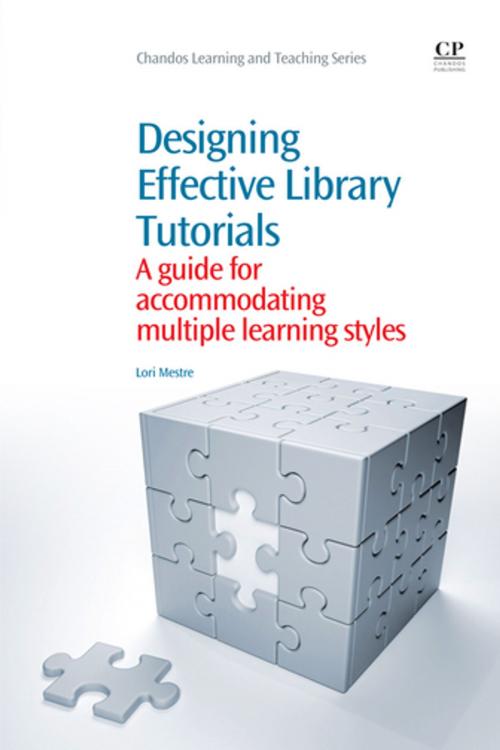Designing Effective Library Tutorials
A Guide for Accommodating Multiple Learning Styles
Nonfiction, Reference & Language, Language Arts, Library & Information Services, Education & Teaching, Teaching, Teaching Methods, Reference| Author: | Lori Mestre | ISBN: | 9781780633251 |
| Publisher: | Elsevier Science | Publication: | October 23, 2012 |
| Imprint: | Chandos Publishing | Language: | English |
| Author: | Lori Mestre |
| ISBN: | 9781780633251 |
| Publisher: | Elsevier Science |
| Publication: | October 23, 2012 |
| Imprint: | Chandos Publishing |
| Language: | English |
Learning styles are highly relevant for students in the online environment. Designing Effective Library Tutorials provides examples of, and steps for, how to create tutorials that match learning styles, based on usability studies of students from various cultural groups and styles of learning. The book presents studies, practical suggestions, and examples to assist librarians and faculty as they develop online programs for students from diverse learning styles. Research on learning style preferences in the online environment emphasizes the need to provide a variety of methods that include text, aural, visual, and kinesthetic examples. Geared for the practitioner working in online learning, the book summarizes current literature, and presents best practices for designing effective online tools for diverse learners, including suggestions for assessment of learning objects.
This title is structured into twelve chapters, covering: The learning style debate: do we need to match up learning styles with presentation styles? Overview of learning style theories and learning style results from various studies; The intersection of culture and learning styles; The need for learning object development; Current practice: categories and features of library tutorials; Effective design of learning objects; Pedagogical considerations for tutorials; Interactivity options for tutorials; Assessment of learning objects; The value and process of usability studies; Marketing learning objects for broad visibility; and a section on resources.
- Provides results from usability studies conducted with students that assess learning style and the resulting effectiveness of tutorials based on their preferred style
- Compares approaches and software used by librarians and educators to create tutorials, along with examples of pitfalls and benefits of each for various learning styles
- Incorporates examples of ways to use software while including learning objects to match learning style
Learning styles are highly relevant for students in the online environment. Designing Effective Library Tutorials provides examples of, and steps for, how to create tutorials that match learning styles, based on usability studies of students from various cultural groups and styles of learning. The book presents studies, practical suggestions, and examples to assist librarians and faculty as they develop online programs for students from diverse learning styles. Research on learning style preferences in the online environment emphasizes the need to provide a variety of methods that include text, aural, visual, and kinesthetic examples. Geared for the practitioner working in online learning, the book summarizes current literature, and presents best practices for designing effective online tools for diverse learners, including suggestions for assessment of learning objects.
This title is structured into twelve chapters, covering: The learning style debate: do we need to match up learning styles with presentation styles? Overview of learning style theories and learning style results from various studies; The intersection of culture and learning styles; The need for learning object development; Current practice: categories and features of library tutorials; Effective design of learning objects; Pedagogical considerations for tutorials; Interactivity options for tutorials; Assessment of learning objects; The value and process of usability studies; Marketing learning objects for broad visibility; and a section on resources.
- Provides results from usability studies conducted with students that assess learning style and the resulting effectiveness of tutorials based on their preferred style
- Compares approaches and software used by librarians and educators to create tutorials, along with examples of pitfalls and benefits of each for various learning styles
- Incorporates examples of ways to use software while including learning objects to match learning style















